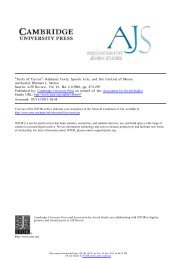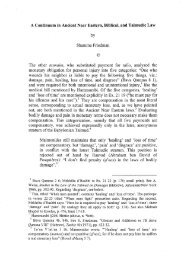Torah in the Mouth.pdf
Torah in the Mouth.pdf
Torah in the Mouth.pdf
You also want an ePaper? Increase the reach of your titles
YUMPU automatically turns print PDFs into web optimized ePapers that Google loves.
<strong>Torah</strong> <strong>in</strong> <strong>the</strong> <strong>Mouth</strong>, Writ<strong>in</strong>g and Oral Tradition <strong>in</strong> Palest<strong>in</strong>ian Judaism, 200 BCE - 400 CE<br />
Jaffee, Mart<strong>in</strong> S., Samuel and Al<strong>the</strong>a Stroum Professor of Jewish Studies, University of Wash<strong>in</strong>gton<br />
Pr<strong>in</strong>t publication date: 2001, Published to Oxford Scholarship Onl<strong>in</strong>e: November 2003<br />
Pr<strong>in</strong>t ISBN-13: 978-0-19-514067-5, doi:10.1093/0195140672.001.0001<br />
central question about <strong>the</strong> authority of <strong>the</strong> orally performed traditions of read<strong>in</strong>g and exposition that circulated with<strong>in</strong> <strong>the</strong> textual study<br />
sessions of <strong>the</strong> Yahad. Text-<strong>in</strong>terpretive tradition—<strong>the</strong> cumulative results of multiple textual read<strong>in</strong>gs built up over time <strong>in</strong> <strong>the</strong> memories of<br />
<strong>the</strong> community's members—was received not as tradition transmitted from <strong>the</strong> past, but as ongo<strong>in</strong>g revelation cont<strong>in</strong>u<strong>in</strong>g <strong>in</strong>to <strong>the</strong> present.<br />
While delivered orally <strong>in</strong> <strong>the</strong> context of textual study, it appears to have been rout<strong>in</strong>ely compiled, reformulated, and transmitted <strong>in</strong> written<br />
compositions that <strong>the</strong>mselves were subjected to oral-performative exposition. There is no suggestion <strong>in</strong> any of <strong>the</strong> Yahad-related<br />
materials, however, that <strong>the</strong> group assigned authoritative status to an unwritten body of collective tradition on <strong>the</strong> specific grounds that it<br />
had been orally mediated through ancient tradition. While oral teach<strong>in</strong>g was clearly <strong>the</strong> norm—people acted “<strong>in</strong> accord with <strong>the</strong> dictates” (‘l<br />
py) of selected teachers and heard <strong>the</strong> pronouncements of <strong>the</strong> expounders of <strong>the</strong> <strong>Torah</strong>—<strong>the</strong> authority of <strong>the</strong> teach<strong>in</strong>g appears to have<br />
been<br />
end p.37<br />
connected <strong>in</strong>extricably to that of <strong>the</strong> writ<strong>in</strong>gs from which it orig<strong>in</strong>ated. And <strong>the</strong> def<strong>in</strong>itive expression of its authority was found not <strong>in</strong> its oral<br />
nature, but ra<strong>the</strong>r <strong>in</strong> <strong>the</strong> fact of its hav<strong>in</strong>g been itself <strong>in</strong>scribed on <strong>the</strong> leaves of scrolls.<br />
From this perspective, <strong>the</strong> Yahad's engagement with written texts is wholly cont<strong>in</strong>uous with those common among <strong>the</strong> broader scribal<br />
communities discussed <strong>in</strong> chapter 1. In those communities <strong>the</strong> authoritative oral moment of textual tradition, <strong>in</strong> itself authoriz<strong>in</strong>g fur<strong>the</strong>r<br />
explicative teach<strong>in</strong>gs, was located at <strong>the</strong> orig<strong>in</strong>s of <strong>the</strong> book, <strong>in</strong> a disclosive moment of authorial illum<strong>in</strong>ation. The contents of <strong>the</strong> oral-<br />
literary tradition that had escaped written form was not perceived at all as an entity dist<strong>in</strong>ct from <strong>the</strong> book; ra<strong>the</strong>r, it was carried along<br />
with<strong>in</strong> <strong>the</strong> orbit of <strong>the</strong> written text itself, as <strong>the</strong> performative tradition of its public exposition.<br />
What dist<strong>in</strong>guished <strong>the</strong> Yahad from o<strong>the</strong>r Second Temple literary circles was one simple fact: while <strong>the</strong> scribal progenitors of such<br />
venerable texts as <strong>the</strong> <strong>Torah</strong> of Moses, <strong>the</strong> Enochic works, or Jubilees located <strong>the</strong> orig<strong>in</strong>s of <strong>the</strong>ir revelations <strong>in</strong> <strong>the</strong> distant past, <strong>the</strong><br />
Yahad regarded itself as blessed to have such prophets <strong>in</strong> its very midst. Delivered with prophetic authority, <strong>the</strong> liv<strong>in</strong>g traditions of <strong>the</strong><br />
community were perceived not as supplements to prophetic books, but as div<strong>in</strong>e disclosures <strong>the</strong>mselves. As such, <strong>the</strong>y were recorded <strong>in</strong><br />
written texts, upon which alone all o<strong>the</strong>r forms of unwritten tradition would f<strong>in</strong>d <strong>the</strong>ir attenuated authority. How was it different, we may now<br />
wonder, among those o<strong>the</strong>r formidable opponents of <strong>the</strong> Yahad and its text-<strong>in</strong>terpretive traditions—<strong>the</strong> Second Temple Pharisees?<br />
end p.38<br />
PRINTED FROM OXFORD SCHOLARSHIP ONLINE (www.oxfordscholarship.com). (c) Copyright Oxford University Press, 2003 - 2011. All Rights Reserved.<br />
Under <strong>the</strong> terms of <strong>the</strong> licence agreement, an <strong>in</strong>dividual user may pr<strong>in</strong>t out a PDF of a s<strong>in</strong>gle chapter of a monograph <strong>in</strong> OSO for personal use (for details<br />
see http://www.oxfordscholarship.com/oso/public/privacy_policy.html).<br />
Subscriber: Columbia University; date: 20 September 2011

















